As others have said, this will write out of bounds if the input read by scanf is too big. Writing out of bounds, reading invalid memory, etc. are undefined behavior. Being undefined admits the possibilities that the code may crash or work just fine as you see here.
For debugging cases when you suspect there may be such a problem, I'd suggest using address sanitizer (and the other sanitizers). Those will identify the exact spot of issues in your program by turning various kinds of bugs and undefined behavior into reproducible hard errors.
$ gcc -fsanitize=address foo.c -static-libasan -g
$ ./a.out
Insert the number of caracters that u want to enter: 2
Insert the string of 2 size: aaa
=================================================================
==27085==ERROR: AddressSanitizer: heap-buffer-overflow on address 0x602000000012 at pc 0x55efb85ade6a bp 0x7ffc2efa1b40 sp 0x7ffc2efa12c8
WRITE of size 4 at 0x602000000012 thread T0
#0 0x55efb85ade69 in scanf_common(void*, int, bool, char const*, __va_list_tag*) (/home/ry/a.out+0x49e69)
#1 0x55efb85aec38 in __isoc99_vscanf (/home/ry/a.out+0x4ac38)
#2 0x55efb85aed3e in __interceptor___isoc99_scanf (/home/ry/a.out+0x4ad3e)
#3 0x55efb866a115 in main /home/ry/foo.c:14
#4 0x7f5902ecebf6 in __libc_start_main (/lib/x86_64-linux-gnu/libc.so.6+0x21bf6)
#5 0x55efb856b9d9 in _start (/home/ry/a.out+0x79d9)
0x602000000012 is located 0 bytes to the right of 2-byte region [0x602000000010,0x602000000012)
allocated by thread T0 here:
#0 0x55efb86297b0 in malloc (/home/ry/a.out+0xc57b0)
#1 0x55efb866a0d1 in main /home/ry/foo.c:11
#2 0x7f5902ecebf6 in __libc_start_main (/lib/x86_64-linux-gnu/libc.so.6+0x21bf6)
SUMMARY: AddressSanitizer: heap-buffer-overflow (/home/ry/a.out+0x49e69) in scanf_common(void*, int, bool, char const*, __va_list_tag*)
Shadow bytes around the buggy address:
0x0c047fff7fb0: 00 00 00 00 00 00 00 00 00 00 00 00 00 00 00 00
0x0c047fff7fc0: 00 00 00 00 00 00 00 00 00 00 00 00 00 00 00 00
0x0c047fff7fd0: 00 00 00 00 00 00 00 00 00 00 00 00 00 00 00 00
0x0c047fff7fe0: 00 00 00 00 00 00 00 00 00 00 00 00 00 00 00 00
0x0c047fff7ff0: 00 00 00 00 00 00 00 00 00 00 00 00 00 00 00 00
=>0x0c047fff8000: fa fa[02]fa fa fa fa fa fa fa fa fa fa fa fa fa
0x0c047fff8010: fa fa fa fa fa fa fa fa fa fa fa fa fa fa fa fa
0x0c047fff8020: fa fa fa fa fa fa fa fa fa fa fa fa fa fa fa fa
0x0c047fff8030: fa fa fa fa fa fa fa fa fa fa fa fa fa fa fa fa
0x0c047fff8040: fa fa fa fa fa fa fa fa fa fa fa fa fa fa fa fa
0x0c047fff8050: fa fa fa fa fa fa fa fa fa fa fa fa fa fa fa fa
Shadow byte legend (one shadow byte represents 8 application bytes):
Addressable: 00
Partially addressable: 01 02 03 04 05 06 07
Heap left redzone: fa
Freed heap region: fd
Stack left redzone: f1
Stack mid redzone: f2
Stack right redzone: f3
Stack after return: f5
Stack use after scope: f8
Global redzone: f9
Global init order: f6
Poisoned by user: f7
Container overflow: fc
Array cookie: ac
Intra object redzone: bb
ASan internal: fe
Left alloca redzone: ca
Right alloca redzone: cb
==27085==ABORTING
